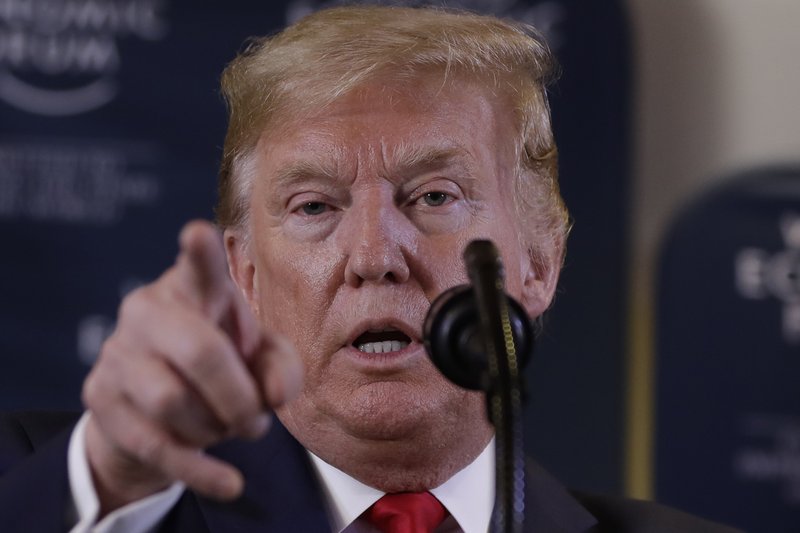DAVOS, Switzerland -- President Donald Trump hinted that sanctions on Iraq were still a possibility in a bilateral meeting with Iraq's president Wednesday, the first since a U.S. drone strike on Iraqi soil killed a top Iranian general at the Baghdad airport.
Also on Wednesday, Trump minimized the severity of head injuries suffered by U.S. troops during Iran's retaliatory Jan. 8 attack on Al Asad Air Base in Iraq, in which 11 ballistic missiles caused deep craters and charred wreckage.
"I heard they had headaches and a couple of other things ... and I can report it is not very serious," Trump said at a news conference in Davos, Switzerland.
Iraqi President Barham Saleh met with Trump on the sidelines of the annual World Economic Forum in Davos, Switzerland, as Iran-backed militia groups threatened to exact revenge should he sit down with the American president.
It was the first high-level meeting since the Jan. 3 U.S. drone strike that killed Iranian Gen. Qassem Soleimani and senior Iraqi militia commander Abu Mahdi al-Muhandis at Baghdad's airport. The attack provoked the ire of Iraqi officials across the political spectrum and led to the passing of a nonbinding resolution to oust U.S. troops from Iraq.
In response, Trump threatened sanctions in Iraq, which would have profound and devastating effects on the country's economy if realized.
Trump said Washington and Baghdad have had "a very good relationship" and that the two countries had a "host of very difficult things to discuss," in remarks to reporters.
Asked whether the administration was still considering slapping sanctions on Iraq, Trump said: "We'll see what happens because we have to do things on our terms."
Saleh interjected here, saying the two countries shared common interests including the fight against extremism, regional stability and an independent Iraq.
"And we're also involved with them in their oil business, and that's always been very important from their standpoint and from our standpoint. So we have a lot of very positive things to talk about," said Trump.
Asked whether there was a plan for U.S. troops to remain in Iraq, Trump said: "We're down to 5,000. So we're down to a very low number -- historically low. And we'll see what happens."
There are approximately 5,200 U.S. troops in Iraq advising and assisting Iraqi security forces in the fight against the Islamic State group.
The Iraqi militia group Kataeb Hezbollah, backed by Iran, had warned Saleh in statements posted online to avoid meeting Trump or not to return to Baghdad if he did. The same group threatened lawmakers not to vote against the resolution to oust U.S. troops.
A march organized by supporters of influential Shiite cleric Moqtada al-Sadr in favor of pushing out American troops was set for Friday in Baghdad. It has the backing of both Hadi al-Ameri, head of the parliamentary Fatah bloc, as well as Iran-backed militia leader Qais al-Khazali, the head of Asaib al-Haq. Al-Sadr's party won the largest number of seats in Iraq's 2018 federal election.
Trump offered his comments on the injured soldiers and airmen after the Pentagon acknowledged Tuesday evening that more U.S. service members have been removed from Iraq for treatment and testing after suffering from concussion-like symptoms.
Defense officials said that about 10 more service members were flown to Germany in recent days. Most were being treated for symptoms related to possible traumatic brain injury. A smaller number may have been suffering from psychological trauma, according to two defense officials who discussed the matter on condition of anonymity.
Air Force Maj. Gen. Alex Grynkewich, a senior commander for the U.S. mission in Iraq and Syria, told reporters outside Washington on Wednesday that he believes the number of service members who will need treatment is "in the teens." He said that they were "looked at for TBI," an acronym for traumatic brain injury that can range from a mild concussion to something more serious.
Information for this article was contributed by Samya Kullab, Darlene Superville, Jill Colvin, Robert Burns, Lolita C. Baldor and Qassem Abdul-Zahra of The Associated Press; and by Dan Lamothe of The Washington Post.
A Section on 01/23/2020

